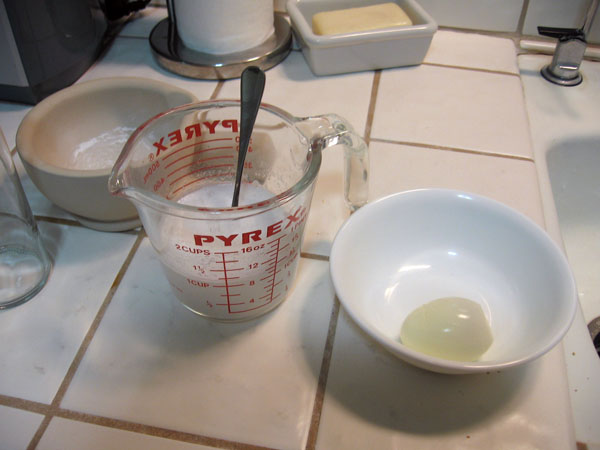On a daily basis, I read kottke.org and last week saw Jason's note on How to unboil an egg, which links to this article in which Hervé This explains that you can unboil an egg.
The science makes sense. The proteins in an egg bind up with each other as heat is applied, this is called denaturation. To break these bonds, you should be able to reverse the denaturation of the proteins, restoring them to a simpler state. The article recommends sodium borohydride, but says that Vitamin C (also know as ascorbic acid) will work.
I decided to give unboiling an egg a try.

First, I boiled an egg using the highly calibrated egg timer my wife supplied me with.

Next I ground up 10 tablets of Vitamin C with my mortar and pestle. Each being a 1,000 milligrams, adding up to 10 grams of Vitamin C.

Vitamin C (ascorbic acid) is soluble in water, so I mixed the powder into 1 cup of hot water. I stirred the solution for several minutes until all that I could dissolve was dissolved.

I place the hard boiled egg with the Vitamin C solution into a tall POM glass. (Update: For clarity, I did shell the egg before putting it inside the glass.)

I set the glass on a plate in the dining room and prepared to wait. I was expecting great things. I even set up a timelapse camera to record the experiment. I let the experiment set for 11 hours (7PM to 6AM).
Rather than write what I saw, it's simpler to just show you...
Yep, nothing happened.

The egg was whole and appeared completely unaffected. The texture of the egg outside felt normal and in no way 'unboiled'.
While I am a professional engineer, I am a amateur scientist.
There are several reasons this process might not have unboiled the egg.
- 10 grams is not enough ascorbic acid to make a solution powerful enough to denature the protein binds
- The vitamin tablets include buffering agents that reduce the acidity (so it doesn't hurt your tummy...)
- The process should have lasted longer than 11 hours
- I should have used sodium borohydride, not ascorbic acid
- You can't unboil an egg
In any case, I gave it a try. What are your thoughts?
Posted by michael at February 17, 2008 10:08 AM